
This interview was done in Dortmund in 1991 with Kriegsmarine hero, Knight's Cross winner and one man torpedo crewman, Walther Gerhold.
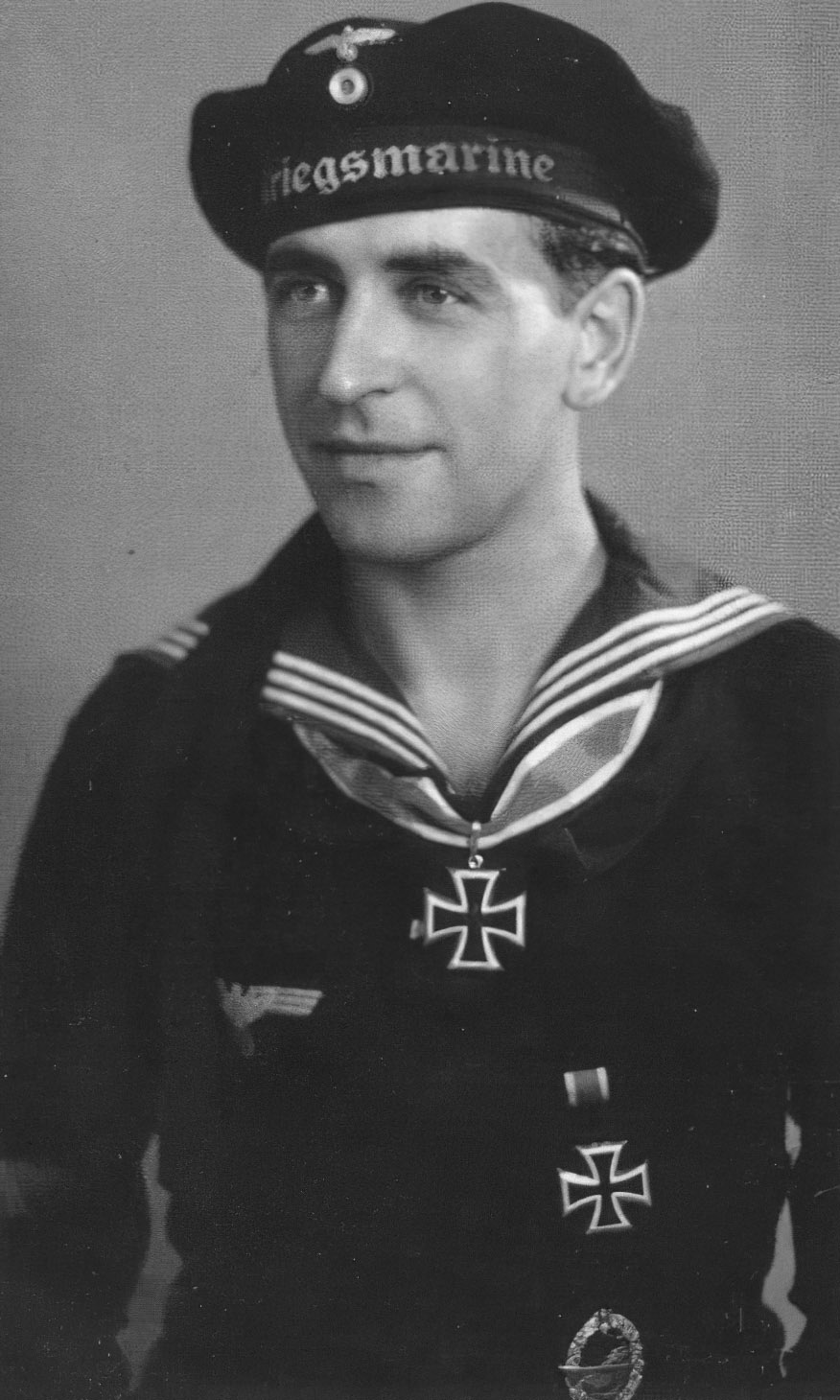

This interview was done in Dortmund in 1991 with Kriegsmarine hero, Knight's Cross winner and one man torpedo crewman, Walther Gerhold.

Thanks you meeting with us Herr Gerhold, if I can I would like to start by asking you what life was like for you in the Third Reich?
Walther: Certainly young man, you are most welcome. Life for me during that time was good, I had no complaints. I was a young man when Hitler and his party came to power and life in Germany seemed to change. I was not in a bustling metropolis; as a matter of fact I grew up not too far away in a small village.
We were not hit badly by the economy like the farmers and big cities were. We lived a simple yet comfortable life. We also stayed out of politics that is for sure. There was no place there for brawling. We would read about the street battles between the brown shirts and the reds.
You know they marched through our town once on their way to something, there was a big spectacle and people came out to cheer them on. I was very young but I too was taken in by the precision and poise they had. Many were veterans from the first war, and wore their decorations. One man stopped to give our group some chocolate; he bore the Iron Cross from the first war.
We later heard they got into a big fight with massed reds, and routed them from the area. That was the most excitement we saw I am afraid. However you asked how life was, most all who lived during this time would say they had no complaints. The war is a different matter, no one wanted to be at war. Germans only wanted to live a peaceful existence without any foreign interference.
I remember as a teen having to go around town with the youth groups and help our neighbors. Any elderly people were constantly checked on and helped. We had to rake leaves, deliver food or medicine and so forth. The state took care of all the sick and infirm. We had a man who was dying of a disease and we had to clean his yard while the girls took care of the house.
He was alone but had served in the war so he was given money and aid to meet his needs. This made us feel good to help people; you must always remember to help anyone who needs it. Everyone also seemed to have good prospects for work, either in the factories or in the cities. For farmers there was an increase in need and the state created a special branch to work with them to make sure all their needs were met.
As I said life for many was good until the war came in 1939. It was with sadness that we learned Germany attacked Poland. The party said it was to defend our borders and I did meet a man who informed me it was bad under the Poles. I was 19 then and was anxious to get into the war so I chose to enlist in the Kriegsmarine.
I had some interest in office management so that set my path to have what I thought would be a comfy desk job. The family was glad I was thinking about not being in a front line branch.
What was the training like in the Kriegsmarine? Where did you end up?
Walther: Well I went into my service time in late 1940 and when we reached the barracks we had to smartly march through the gates. This is an old German tradition that you are making the transition from civilian to soldier. As soon as we entered we had to form into ranks, then the yelling started.
They demanded perfection, and obedience, if they said to run to the wall and place two fingers and two thumbs in a certain spot you better get it right or you would have problems. That first night was okay, we ate well, and slept in the next day so we could draw uniforms, equipment, and get a hair cut. Your hair was not shaved like today, but it was trimmed above the ears and collar.
The third day of training all hell broke loose, the training leader came in at 5:00 am, banging a trash pail and screaming to hit the deck. We then had to assemble outside to start what would be a morning regime. We would exercise and run, then back to clean barracks, and then eat breakfast. They would have us drilling for half the day, and then attend classes for naval history, laws, and military discipline.
After doing this life for a few weeks, in the dead of winter this new recruit was moved into training for my specific branch. I wanted naval administration but after the problems in Norway, I was posted to the torpedo boats to help fill their ranks. After further training in administrative work, I was also trained on the actual boats and did some combat patrols later on.
I was awarded the Iron Cross and the Destroyer badge for a successful patrol against the enemy. The naval war was a cat and mouse game where you had to seek and find them, while also avoiding them. We had decent air cover in the early stages, where any enemy aircraft was usually engaged and driven off. Later in the war this cover went away and made us vulnerable from the air.
I was transferred to other naval offices mid-war, as the surface war was not winnable by 1943. Everyone saw it, the main fleet was sunk or out of action, the U-boat was the only branch that was having any success and even they were taking heavy losses. I had friends who served in that arm, and never were seen again. I turned down offers to join, but I did get interested in one new branch.
I was approached about volunteering for a secret branch that would give me a promotion, and command my own boat. It was the one man torpedo concept. This interested me and I agreed to join this new top secret program. Doing this put me in combat and danger, but gave great rewards.
Can I ask what the one man torpedo was all about?
Walher: This was a top secret concept and most curious. These weapons were the G7 torpedo converted with a clear dome that could be steered to a target. They carried another live G7 underneath and when ready you could fire the torpedo at a target. The theory was these one-man weapons could easily sneak up on a ship and launch with a minimal chance of being seen.
In reality this did not work out too well, the plastic glass dome reflected light if the moon was just right, and they made a wake [a wake is a disturbance of the water resulting from a boat moving through the water at high speeds] so an alert eye could see it. The goal was to get so close to the ship, then launch where they could not avoid the hit. You know we had to undergo much training for these Negers [Neger was the German name for torpedo boat] .
We attended diving school and special explosives school in addition to learning all about the G7 and its operation. You had to demonstrate you were the master of this weapon and could use it to its full effect. These were first used against the Allies in 1943 in Italy, and had some success, I knew a friend who was part of that mission.
It is foolish to say now but we were all looking forward to getting into action. We saw the damage the Allies were causing to our homeland and wanted to get revenge on them. Our time came during the invasion of France in Normandy. We were transferred to the area around La Havre and given maps of the area.
I would scan the channel and was amazed at the vastness of the enemy fleets that protected the invasion. I would see escorts and mine sweepers which would come in rather close to fire on the coastal batteries. We heard some spirited fire fights at times. We were made ready by July and briefed on what was to be our first mission.
[Above: Walther Gerhold in the one-man torpedo boat.]
[Above: A lighthearted Walther Gerhold in the one-man torpedo boat.]
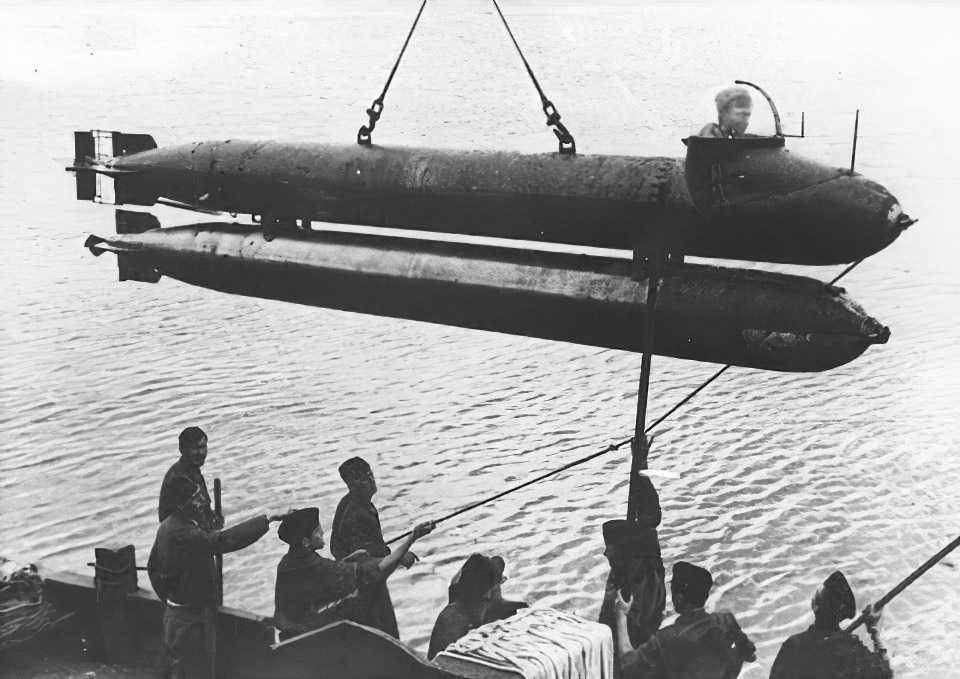
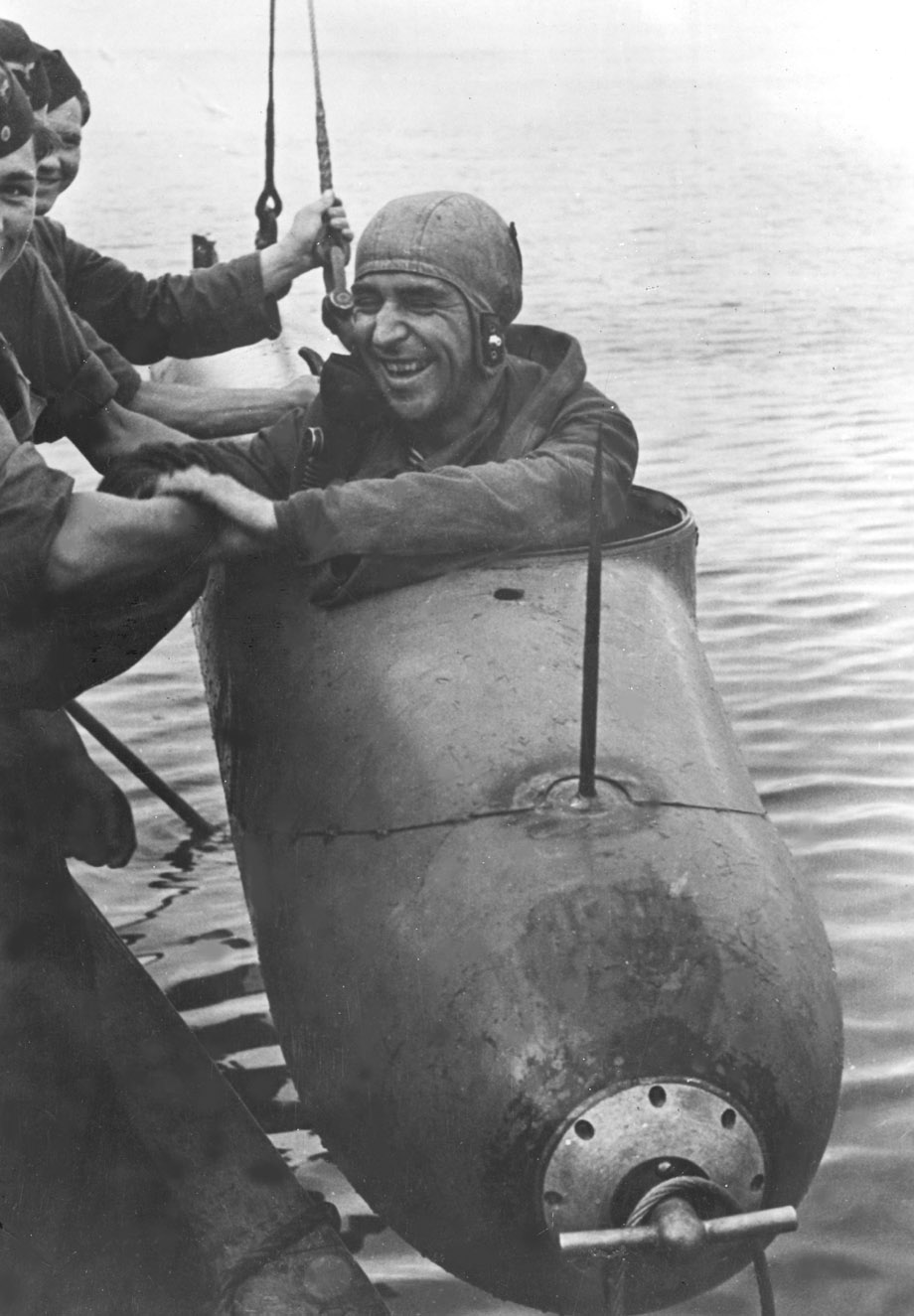
Walther: Yes, we were assembled and given areas to patrol into, and to launch at anything we could get close to. The survival rate was thought to be small for us as the enemy knew we had this weapon and scanned carefully for us. We were 21 Negers and went out late at night on July 7th.
As I launched I could see flashes in the night sky, there was some type of bombing happening at the front. We broke off and headed out into the channel looking for a target. We were taught to fan out and to make it hard to be seen. I could see silhouettes of ships in the distance so I headed for the largest I could make out.
I was stone-cold and frozen as I saw several destroyers and I thought they would see me any moment. I kept going at a slow speed as not to create a wake. I did see the silhouette of a larger warship so I steered towards this target. I was still unnoticed, and was able to slide over their anti-torpedo nets. I made ready the torpedo and aimed for the middle of the ship.
I could see that something in the distant was firing so I assumed they seen one of our men, as I closed in I released the G7 and turned away. I looked back and saw a decent explosion so it appeared I had hit the ship. I made for home as best I could. Other men had hits on ships as well, but we also had losses. It was a nerve-racking trip back to base, the destroyers had lights on the water everywhere.
I learned later that a warship was hit and later sunk, and our unit was responsible for other ships as well. It was deemed a success but we did take losses. The enemy knew we were a potent weapon and they were on guard. They used search lights to ping off our glass tops.
When they found us, they loosed all weapons, guns, planes, and artillery. Even though we were successful it was clear that we were too few. We needed hundreds of these Negers to have a chance and that just was not in the cards. We lost France in August so there was no longer a good base to have at the enemy.
I know you were awarded the Knight's Cross for this, what was that experience like?
Walther: Well, after we arrived back at our base, we were greeted as being successful. Comrades said they could look out in the channel and see the tiny dots on the horizon that were the stricken ships. We were met by our leaders and offered drinks and congratulations.
We were too cold and tired for much jovial banter so we all went right to bed. The next day we were told we had to report for debriefing in the next few days. I heard rumors that I was put in for the Knight's Cross as I had hit a cruiser and put it out of action. This was a big feat for the little Negers.
Up to that point I was a holder of the Iron Cross, Destroyer Badge, and Wound Badge. This action alone earned the Iron Cross first class, and after being sent to Lubeck, I was presented with the awards by Konteradmiral Heye. There was big ceremony as was usual for a high award.
I was with several other comrades who received the German Cross. The other comrades and I were pulled out of the formation, and after giving a short speech, I was called forward to be decorated. The admiral put the cross around my head, and his assistant then tucked it in nicely.
After the award it was customary to march past the assembled men. I must say it was a nice feeling at the time. I was told I was going to be given a lengthy leave, which involved meeting with reporters, and going to Berlin. They said morale needed to be kept up, and the people needed to see this new weapon. I was thrilled to be able to go home and to have some time off.
The training had been very hard; we were trained as special soldiers so they only wanted the toughest that could do it. I felt like we were part of a small elite force that was vital to bringing victory to Germany. You know I was in the papers and magazines, plus a video was made for the weekly newsreel.
A friend visited me and said there is a new device where I can watch these news reels on my TV so he is going to get me one. He said he saw my awarding and tour, so I would like to see it again, it is a tape or something you put in a machine and it shows the video.
No more movie camera and projector, it is all on the TV set now. So there you have it, that is my experience in the war, and being decorated.
It is sometimes interesting to me that so many like you are interested in this old man and my life. It is nice to have visitors nowadays who like to talk, but I am not much on talking about the war. We do not like war, and Germans hate being reminded about what happened back so long ago.
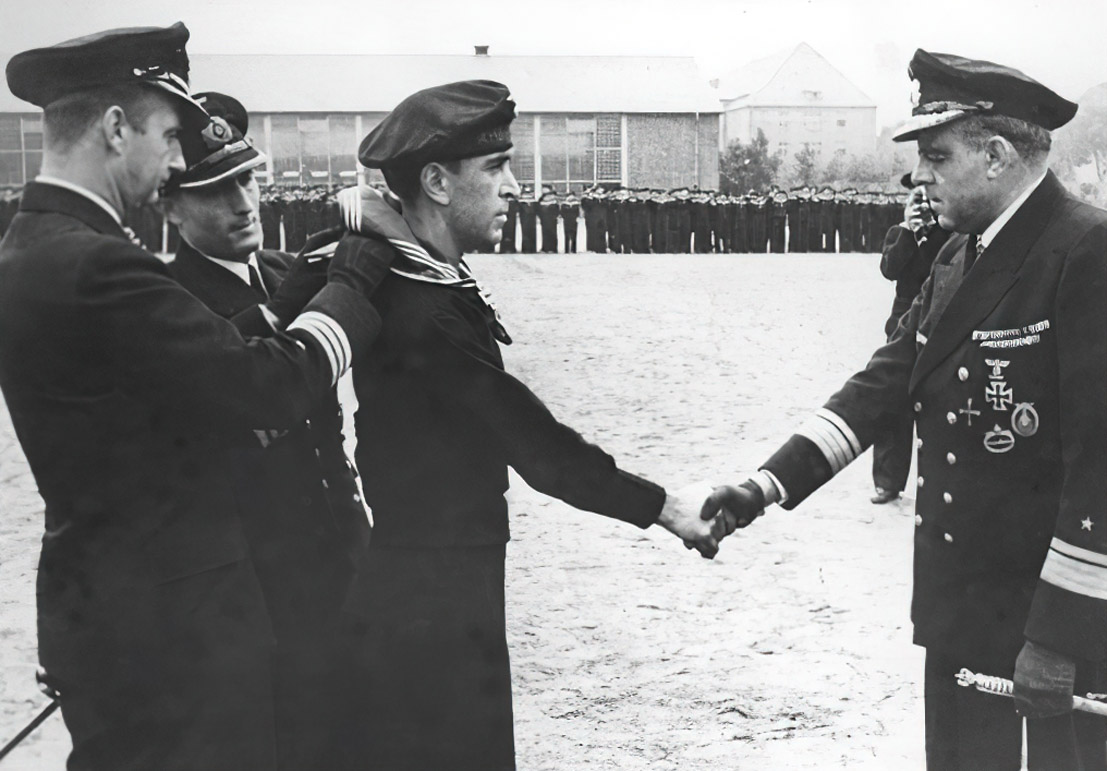
[Above: Walther Gerhold being awarded the coveted Knight's Cross of the Iron Cross by Konteradmiral Heye.]
Walther: You certainly can ask but you may not like my answer. I served in the Kriegsmarine since 1940 and was able to visit some occupied areas. I never saw anything like a terrified population. Many Germans who were on occupation duty had friends or girlfriends they met.
I think the Allies, and especially the Soviets have been very liberal with the truth regarding the war. Now this is not meant to dismiss the true crimes, or downplay them, but we must be careful. There are two sides to an argument, and in regards to the conduct of war, the German side is silenced.
Admiral Dönitz did a good job of defending the U-boat arm against claims of shooting distressed sailors. It has been shown that orders were given to take prisoners, treat civilians well, and to follow the rules of war. It is my belief that we did these things to the letter. They take one rogue person who maybe broke the rules and make them out to be the norm.
That is not correct, and is wrong to do. Now I will say I can not defend against what happened to the Jews. We had no knowledge of what was going on, and did not take part in it. I saw some Jews in Germany living just as before so I do not understand what the policy was supposed to be. They were not all removed, and even some seemed to defend Hitler. Can you imagine?
The camps are a shame, and what happened in them, we all saw the pictures. For that I feel ashamed but I believe there is more to the story. Some I have met claim the Allies caused the deaths as they all happened at the end of the war. I am not an expert, and was not there in the camps so I can not say but we did put them in the camps.
Those who were guilty were made to pay, but I wonder if any innocent people were charged and then executed. I read that good defense was not allowed and they could not challenge if the stories were accurate or not. That really is all I would like to say on this, if you do not mind.
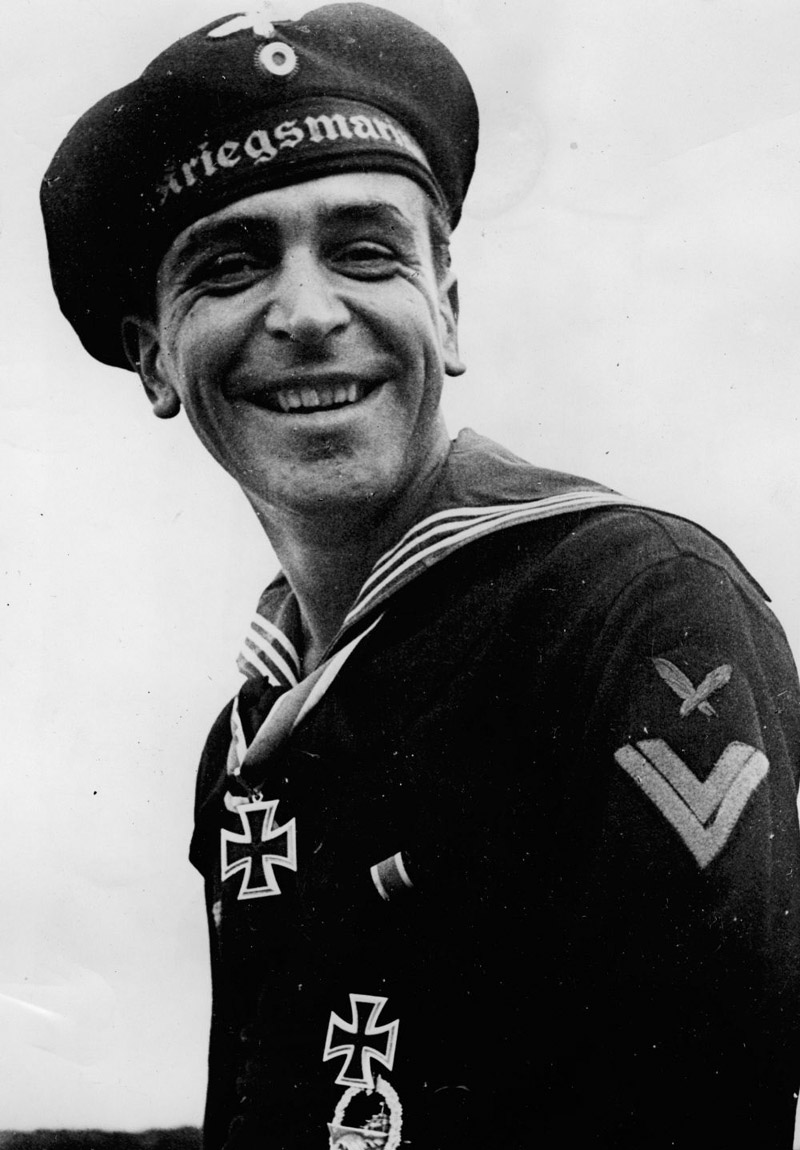
[Above: Walther Gerhold.]